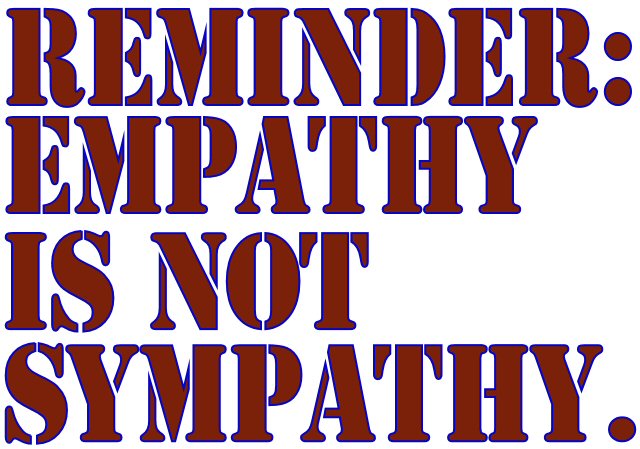Tuesday, March 05, 2019
Another view on empathy
Pointed by TAC, a long and rather academic essay on empathy.
First,
 The main point of the article:
The main point of the article:
 The main point of the article:
The main point of the article:
This viewing experience finally undid for me what I have long suspected to be a meaningless platitude: the idea that art promotes empathy. This idea is particularly prevalent when it comes to those works of art described as “narrative”: stories, novels, TV shows, movies, comics. We assume that works that depict characters in action over time must make us empathize with them, or as the saying goes, “walk a mile in their shoes.” And we assume that this is a good thing. Why?The author concludes that empathy has turned into total subsumption of the viewer within the 'correct' protagonist. I don't think we automatically assume that narrative is meant to create empathy. PAID narratives (TV, radio, movies) use empathy to subsume us because the PAYERS are PAYING to own our souls. Outside the world of paid propaganda, there's no particular correlation between art and empathy. Good fiction is simply an extension of our internal dream scripting ability. A good story performs the same purpose as a useful dream. It gathers up a conflicting set of goals and events, and weaves the pieces together to form a solution. In fiction as in dreams, the stage may be a familiar place with familiar people or a strange place with strange people. Familiar people automatically evoke empathy. When the place and people are strange, the narrator has to work harder to hold our attention and inform us of the solution. A good piece of music does the same without words. Gather a conflicting set of themes, weave them together to form a solution. In 'programmatic' music (for instance and for instance and for instance) the themes are familiar characters evoking automatic empathy. Usually the themes are just music, so the narrator has to work harder. I've noticed a sharp change in the empathy targets of USA media. Before 1960, radio and movies often empathized with ordinary struggling people. The listener could connect to the protagonist and learn how to solve familiar problems. Since 1960, TV and movies center on the rich and famous. Now we're supposed to copy the behaviors and thoughts of the aristocratic protagonist so we can be aristocratic. This leads to UNSOLVING our REAL problems, which requires us to watch more TV, which UNSOLVES more problems, which requires us etc. The endless loop of addiction ruins the viewer and sells the advertiser's product. Insatiables and Deplorables are innately distinct and opposite. Behaviors that work for Insatiables are LETHAL for Deplorables. Trying to be an Insatiable is PHYSICALLY IMPOSSIBLE and DEADLY.
Labels: #DeplorableLivesMatter
